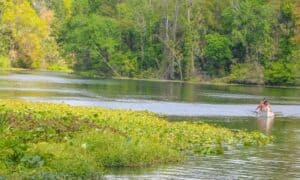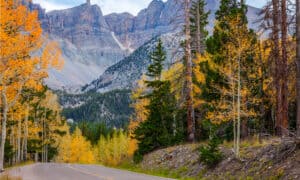In North Carolina, you can find several national parks that preserve some of America’s most beautiful landscapes. These habitats are home to many of the state’s native animal species and plant life. When visiting a North Carolina national park, you might encounter different animals, including black bears, raccoons, and river otters.
Many of the parks have also been impacted by wild boars. According to a study from Environmental Management, these creatures have expanded rapidly and wreak havoc on natural habitats.
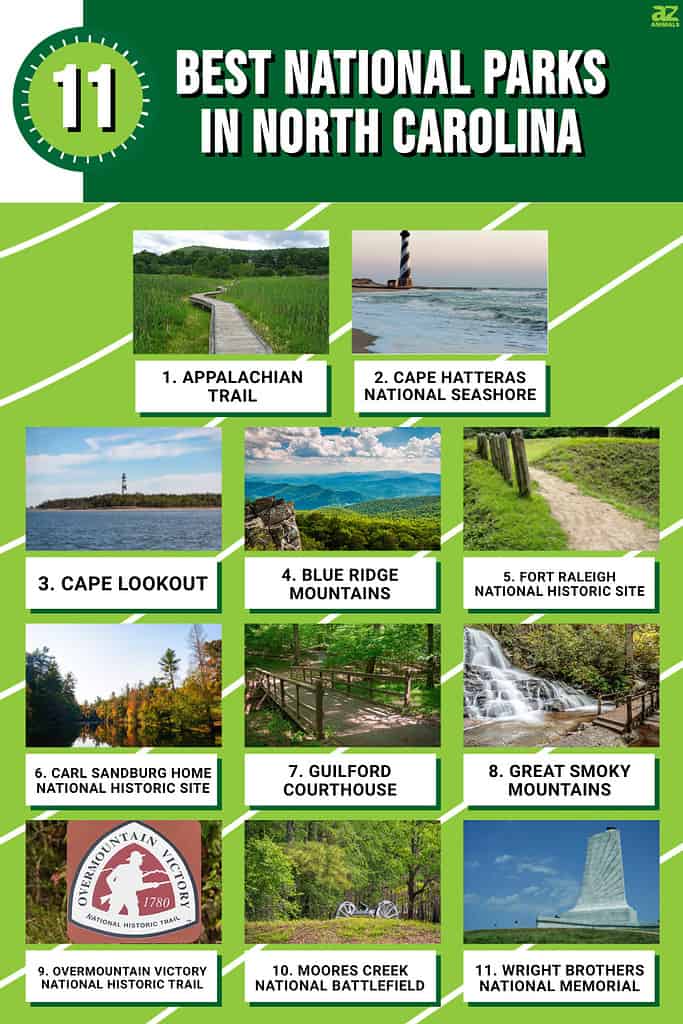
1. Appalachian Trail
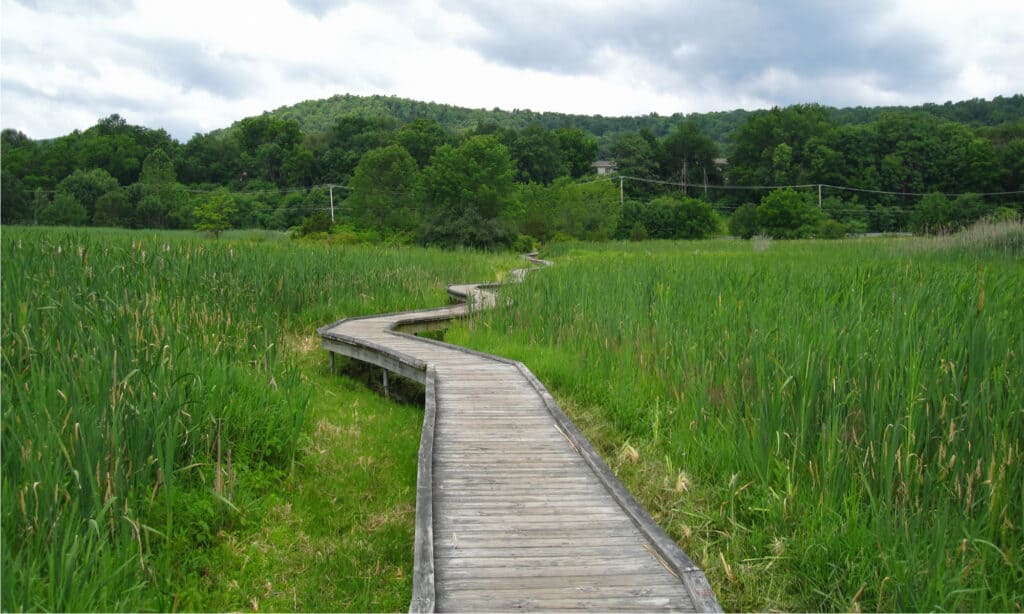
The Appalachian Trail runs through several states from Georgia to Maine, including North Carolina.
©drewthehobbit/Shutterstock.com
| Appalachian Trail | |
|---|---|
| Size | 2,200 miles |
| Animal to see | Red fox |
| Attraction to see | Lemon Gap |
The Appalachian Trail runs through several states from Georgia to Maine, including North Carolina. It’s over two thousand miles long, with footpaths that make it easy to explore the lush forests and lakeshores along the trail. It was first started by private citizens in 1921 and fully completed by 1937. Since this national trail is so long, it relies on thousands of volunteers and multiple state agencies to keep it maintained. There are also segments found in New York, New Jersey, and Tennessee. When exploring the North Carolina sections, you might find cottonmouth snakes and red foxes.
You can read about how long it takes to hike the Appalachian Trail.
2. Cape Hatteras National Seashore
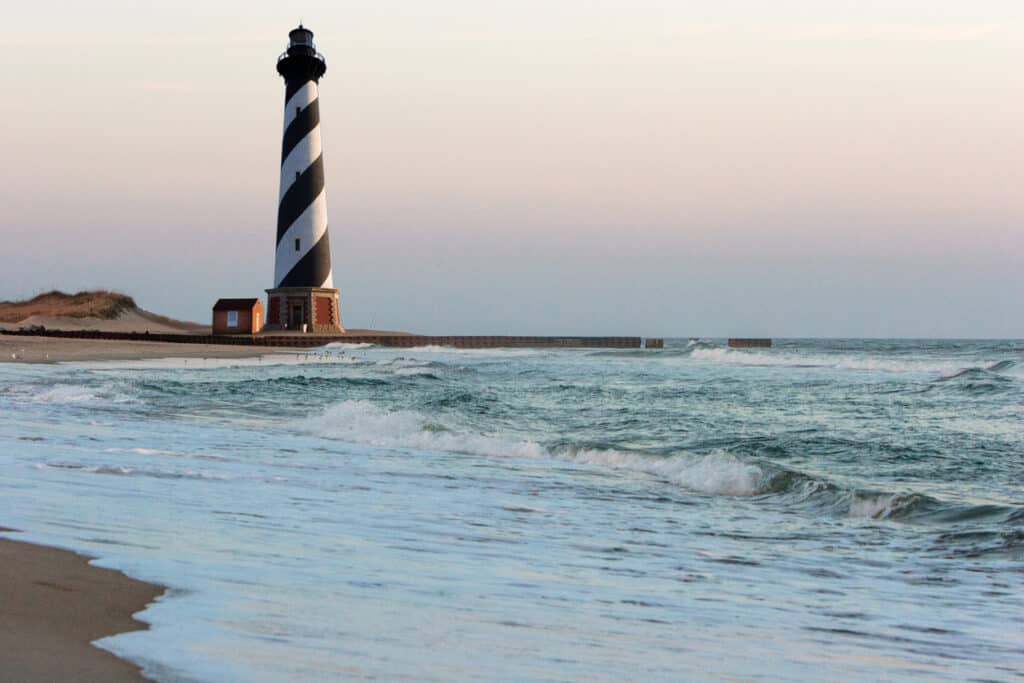
The Cape Hatteras Lighthouse, the biggest attraction in the national park, offers beautiful views of waves and beaches.
©iStock.com/Jens_Lambert_Photography
| Cape Hatteras National Seashore | |
|---|---|
| Size | 30,351 acres |
| Animal to see | Dolphin |
| Attraction to see | Cape Hatteras Lighthouse |
The national seashore of Cape Hatteras can be visited in North Carolina. It’s spread across three islands: Buxton, Nags Head, and Ocracoke. Storms, wind, and water have shaped them for centuries and continue to change the landscape. The Cape Hatteras Lighthouse is the biggest attraction in the national park and offers beautiful views of crashing waves and beaches. Salt marshes offer a great place to relax, and you can see breathtaking stars in the sky on clear nights. There are plenty of places to enjoy kayaking, swimming, or fishing. When visiting these seashores, you might notice dolphins and sea otters.
3. Cape Lookout
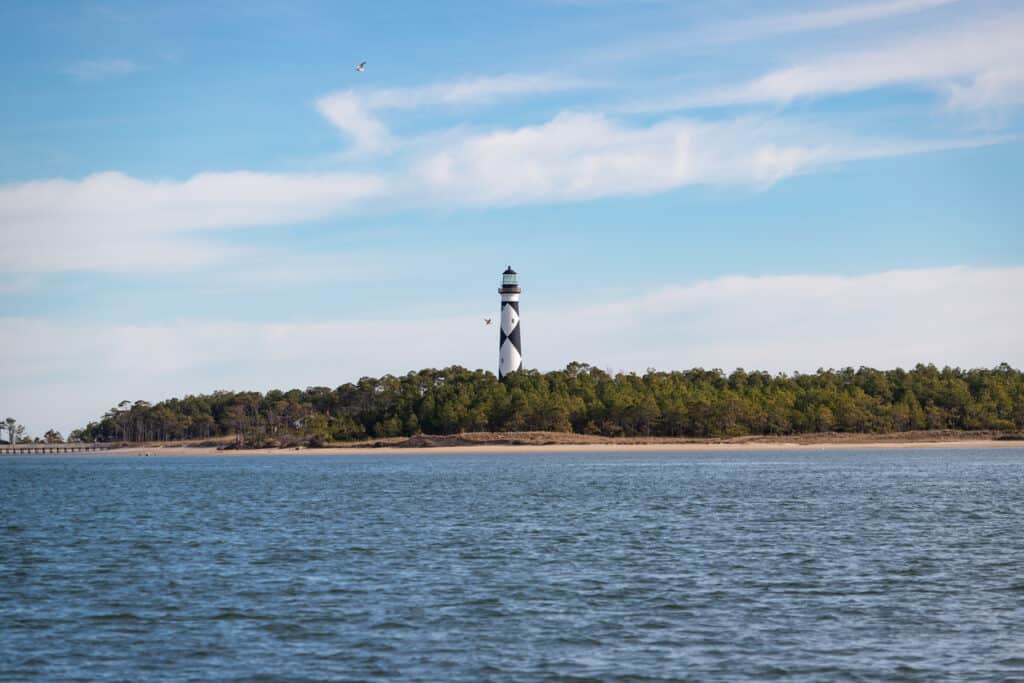
Cape Lookout is in a remote part of North Carolina and is full of wild landscapes to explore.
©iStock.com/Eifel Kreutz
| Cape Lookout | |
|---|---|
| Size | 28,000 acres |
| Animal to see | Wild horse |
| Attraction to see | Harkers Island Lighthouse |
On Harkers Island in North Carolina, you can find the National Park of Cape Lookout. It’s a preserved seashore in the state, with wild horses, historic villages, and a lighthouse to climb. Visitors can also partake in hiking, swimming, bird watching, or fishing. Cape Lookout is in a remote part of North Carolina and is full of wild landscapes to explore. All visitors are asked to bring their supplies, and not leave anything behind when they leave. Cape Lookout is only reached through a three-mile-long boat ride. You’re likely to see dolphins jumping through the waves during the trip.
4. Blue Ridge Mountains
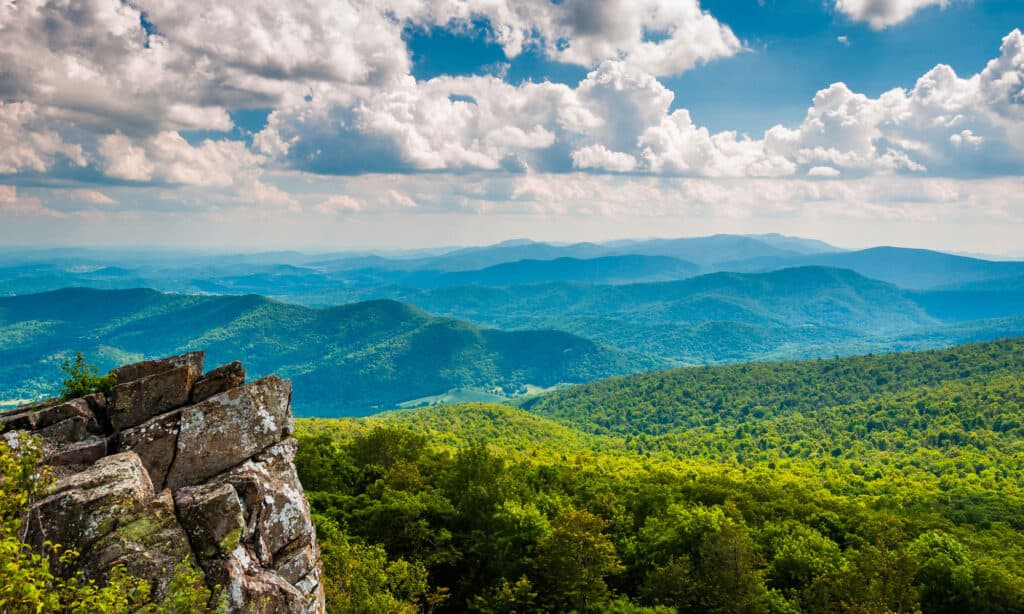
Blue Ridge is one of the best places to enjoy the wild landscapes of North Carolina.
©Jon Bilous/Shutterstock.com
| Blue Ridge Mountains | |
|---|---|
| Size | 93,390 acres |
| Animal to see | Elk |
| Attraction to see | Roanoke Valley |
Blue Ridge is one of the best places to enjoy the wild landscapes of North Carolina. It extends across the Blue Ridge mountain range and into Virginia. There are 469 miles of parkway that let you slowly explore the views. Blue Ridge National Park has diverse wildlife and hundreds of native plant species. When exploring the trails or driving the parkway, you may see elk, black bears, snakes, and skunks.
5. Fort Raleigh National Historic Site
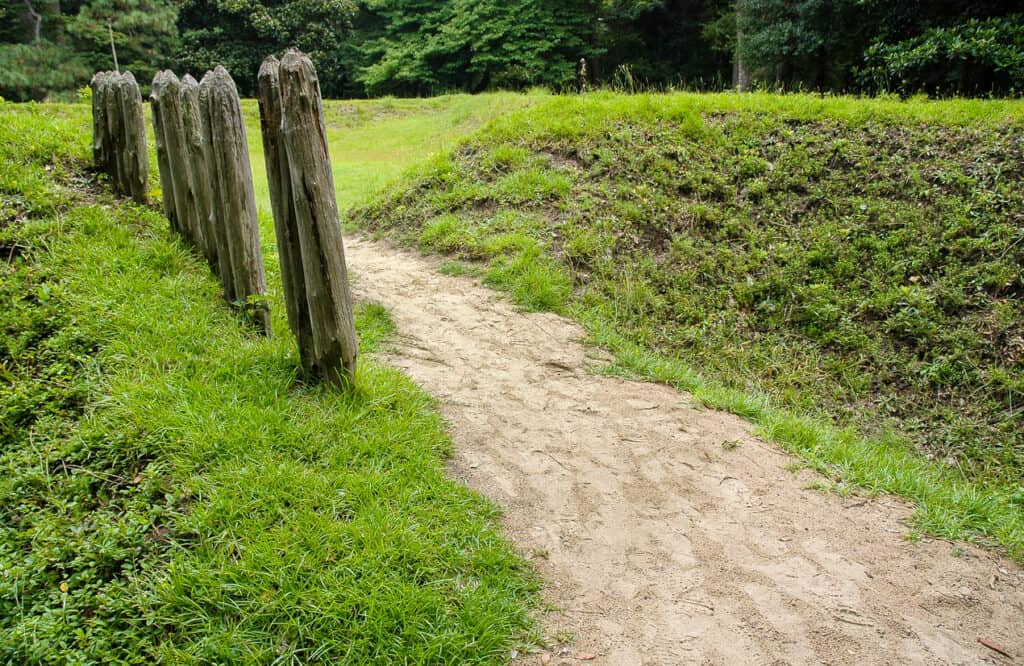
Fort Raleigh National Historic Site was established to preserve settlements from 1584 to 1590.
©iStock.com/zrfphoto
| Fort Raleigh National Historic Site | |
|---|---|
| Size | 14 acres |
| Animal to see | Sea otter |
| Attraction to see | Roanoke Island |
The site of some of the first settlements in America can be visited in North Carolina. Fort Raleigh National Historic Site was established to preserve settlements from 1584 to 1590. You can visit Roanoke Island, where much of the heritage from early Native Americans and Europeans has been protected. It’s located in the city of Manteo and is home to animals that have lived there since the early settlers. You’re likely to come across sea otters, dolphins, raccoons, and a number of reptiles.
6. Carl Sandburg Home National Historic Site
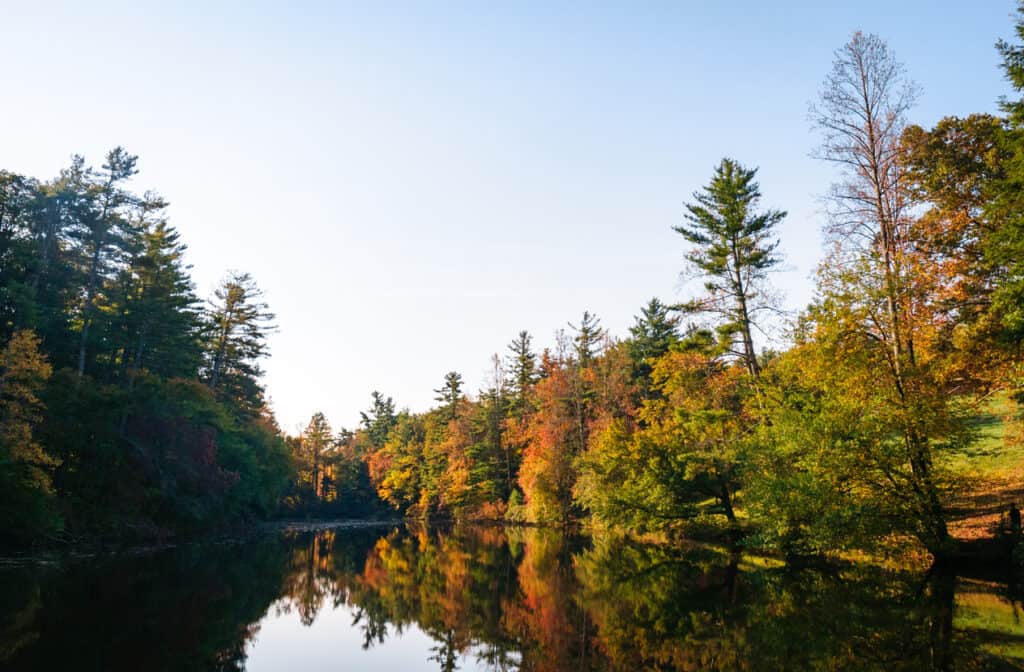
Carl Sandburg Home National Historic Site covers 246 acres of land.
©iStock.com/zrfphoto
| Carl Sandburg Home National Historic Site | |
|---|---|
| Size | 246 acres |
| Animal to see | Muskrat |
| Attraction to see | Sandburg House |
Carl Sandburg was one of the most influential writers of the twentieth century, and he called North Carolina home. His house is still in the state and has been preserved as a National Historic Site. Sandburg was known for his prose, poetry, children’s stories, and more. His home is surrounded by gorgeous North Carolina scenery, and many animals native to the region. While exploring the land, you may run into cottonmouth snakes, muskrats, or opossums.
7. Guilford Courthouse
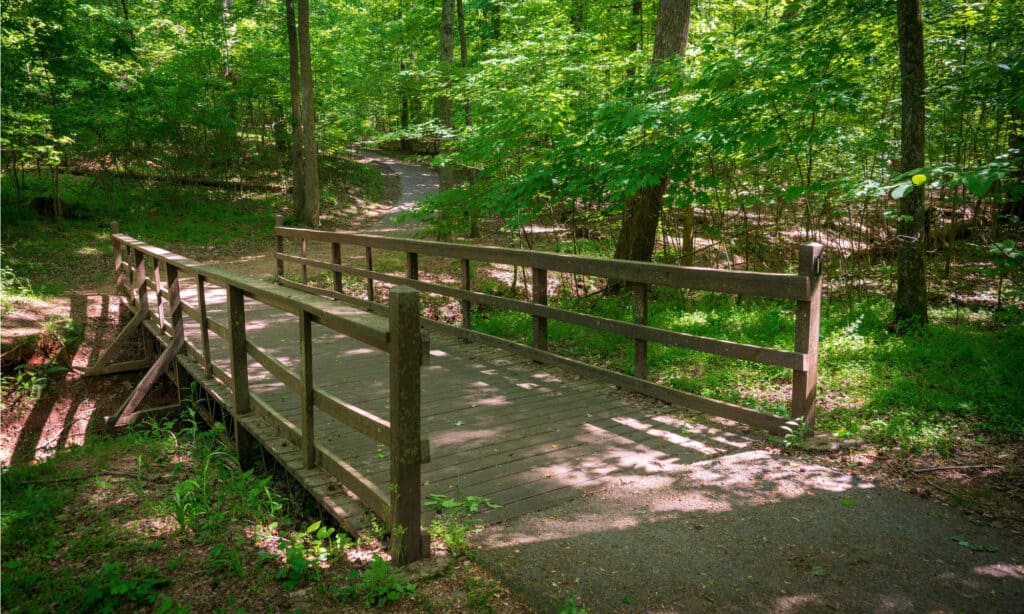
The Guilford Courthouse has been preserved as part of a National Military Park.
©Zack Frank/Shutterstock.com
| Guilford Courthouse | |
|---|---|
| Size | 250 acres |
| Animal to see | Hawk |
| Attraction to see | International Civil Rights Center |
During the American Revolution, a short battle took place outside a courthouse in Greensboro, North Carolina. For two and a half hours, troops following Lt. General Charles and Earl Cornwallis faced off in the streets. This battle was said to change the course of the revolution. The Guilford Courthouse has been preserved as part of a National Military Park and can be visited year-round. It’s surrounded by many lush forests that hold a range of North Carolina wildlife. You may notice deer and elk running through the fields or sparrows and hawks flying overhead.
8. Great Smoky Mountains
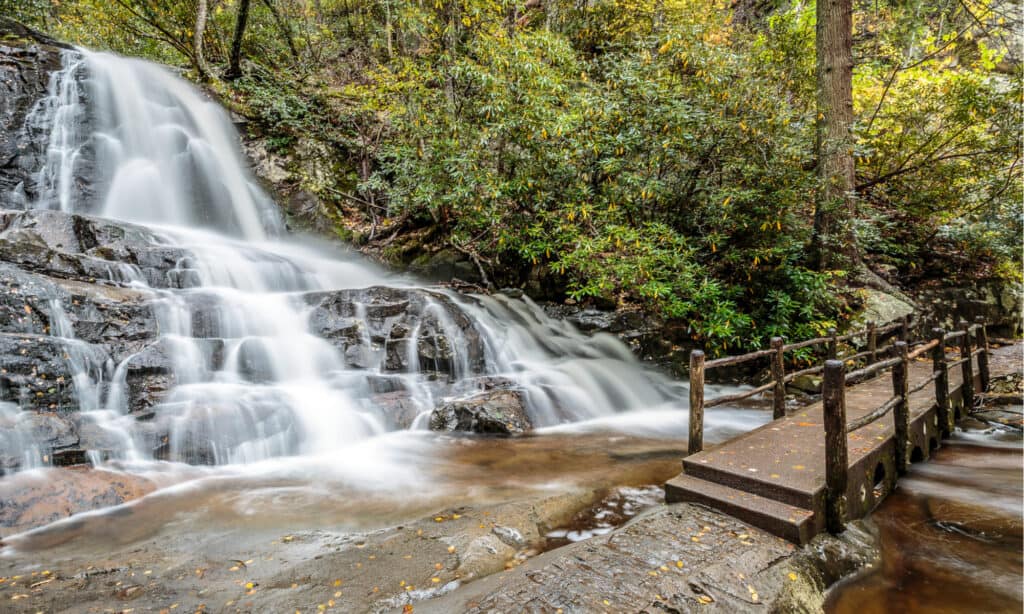
Great Smoky Mountains is home to black bears, raccoons, coyotes, and foxes.
©Weidman Photography/Shutterstock.com
| Great Smoky Mountains | |
|---|---|
| Size | 522,427 acres |
| Animal to see | Coyote |
| Attraction to see | Dollywood |
On the border of North Carolina and Tennessee is the Great Smoky Mountains National Park. You can find a diverse range of animals in these vast landscapes. The park preserves many ancient Southern Appalachian cultural features and is renowned for its breathtaking views. It’s the most visited national park in America and is nearby the popular tourist towns of Gatlinburg and Pigeon Forge. These cities have major attractions, like Dollywood and Ripley’s Aquarium. The mountains of the Smokies are home to black bears, raccoons, snakes, coyotes, and foxes.
9. Overmountain Victory National Historic Trail
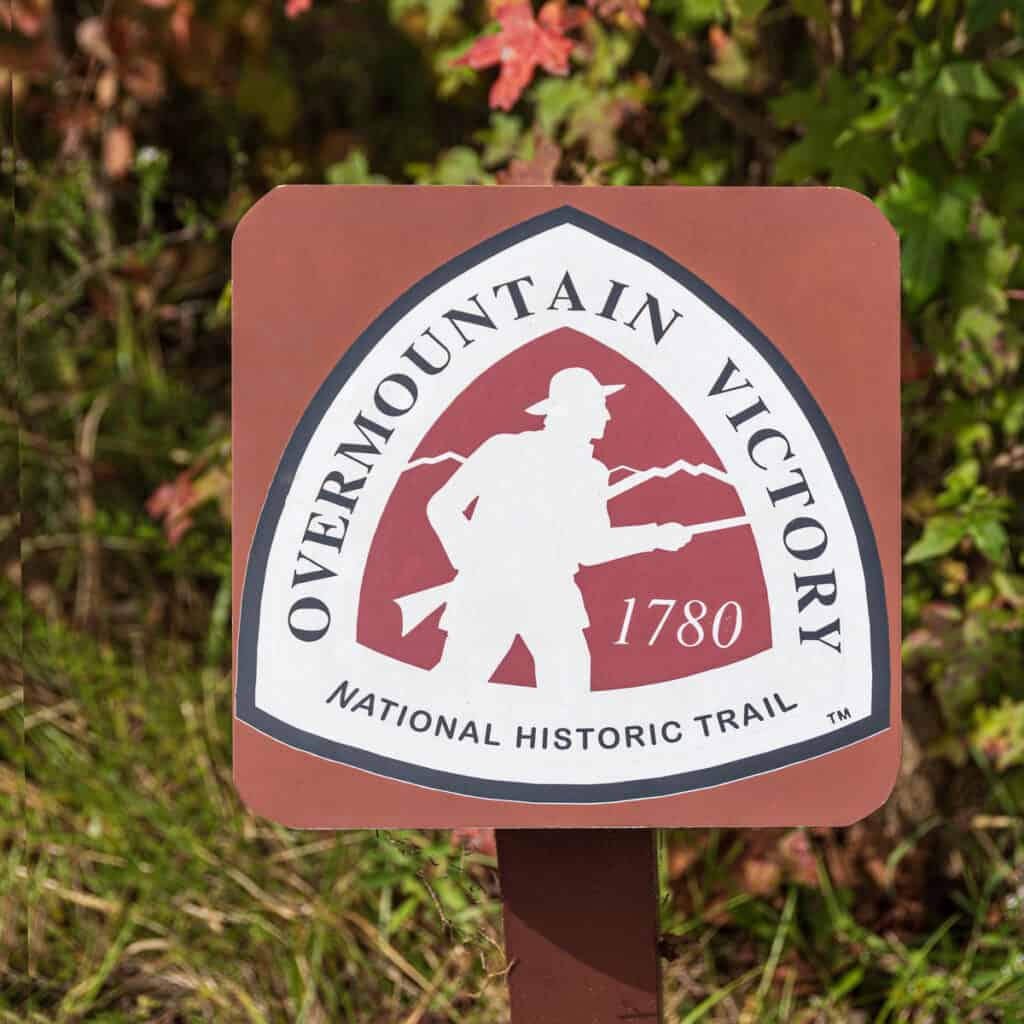
Overmountain Victory was the route for the 1780 Kings Mountain campaign.
©Nolichuckyjake/Shutterstock.com
| Overmountain Victory National Historic Trail | |
|---|---|
| Size | 330 miles |
| Animal to see | Bobcat |
| Attraction to see | Crowders Mountain |
Over 300 miles of National Trail runs through four states: North Carolina, South Carolina, Virginia, and Tennessee. It offers some of the best views in these southern states and runs through habitats with hundreds of native wildlife species. Overmountain Victory was the route for the 1780 Kings Mountain campaign. There is a Commemorative Motor Route that utilizes existing state routes and 87 miles of hiking trails. The region is home to bobcats, coyotes, and a range of snake species.
10. Moores Creek National Battlefield
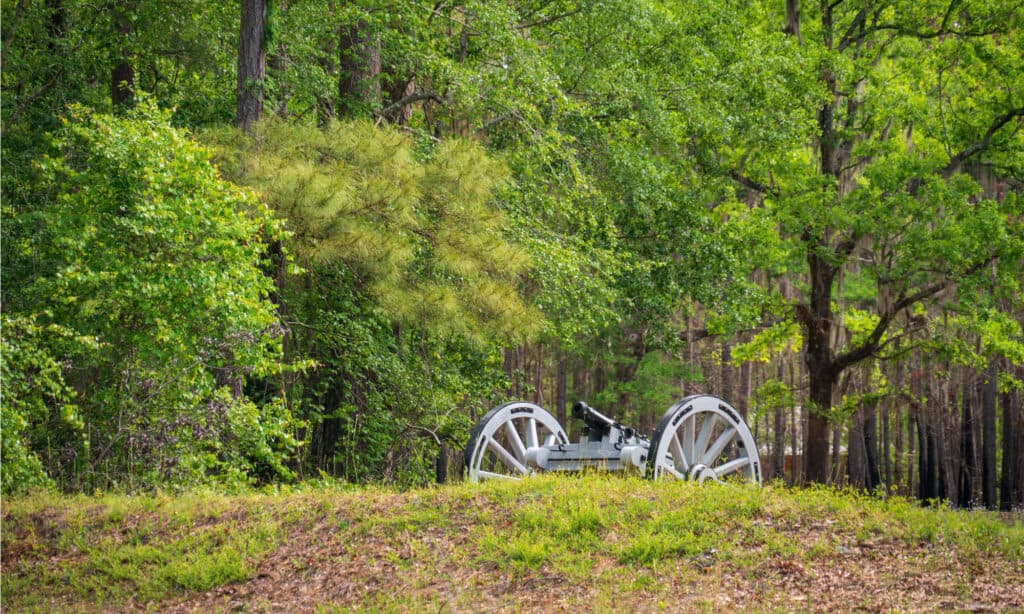
The Moores Creek National Battlefield memorializes where a thousand North Carolina troops fought back Loyalist troops.
©Zack Frank/Shutterstock.com
| Moores Creek National Battlefield | |
|---|---|
| Size | 88 acres |
| Animal to see | Tree frog |
| Attraction to see | Lake Sutton |
Currie, North Carolina is home to the location of America’s first major victory during the American Revolution. The Moores Creek National Battlefield memorializes the site where a thousand North Carolina troops fought back Loyalist troops. Today, it is still scattered with remnants like historical canons and gravesites. Moores Creek is home to various reptiles, as well as tree frogs, deer, and falcons.
11. Wright Brothers National Memorial

Wilbur and Orville Wright created their first successful airplane in North Carolina on December 17, 1903.
©iStock.com/imagewerks
| Wright Brothers National Memorial | |
|---|---|
| Size | 428 acres |
| Animal to see | Corn snake |
| Attraction to see | Wright Brothers Museum |
Wilbur and Orville Wright created their first successful airplane in North Carolina on December 17, 1903. They were self-taught engineers who spent four years inventing and trying to perfect the aircraft. You can visit the location of this historical moment at the Wright Brothers Memorial in Kill Devils Hill. North Carolina landscapes can be seen in the distance of the memorial, home to multiple native species. While visiting this historic site, you might find corn snakes, cottonmouths, deer, and hawks.
Summary of 11 Best National Parks in North Carolina
Here’s a recap of 11 wonderful national parks in the state of North Carolina to check out.
| Number | Park | Size | Animal to See | Attraction to See |
|---|---|---|---|---|
| 1 | Appalachian Trail | 2,200 miles | Red fox | Lemon Gap |
| 2 | Cape Hatteras National Seashore | 30,351 acres | Dolphin | Cape Hatteras Lighthouse |
| 3 | Cape Lookout | 28,000 acres | Wild horse | Harkers Island Lighthouse |
| 4 | Blue Ridge Mountains | 93,390 acres | Elk | Roanoke Valley |
| 5 | Fort Raleigh National Historic Site | 14 acres | Sea otter | Roanoke Island |
| 6 | Carl Sandburg Home National Historic Site | 246 acres | Muskrat | Sandburg House |
| 7 | Guilford Courthouse | 250 acres | Hawk | International Civil Rights Center |
| 8 | Great Smoky Mountains | 522,427 acres | Coyote | Dollywood |
| 9 | Overmountain Victory National Historic Trail | 330 miles | Bobcat | Crowders Mountain |
| 10 | Moores Creek National Battlefield | 88 acres | Tree frog | Lake Sutton |
| 11 | Wright Brothers National Memorial | 428 acres | Corn snake | Wright Brothers Museum |
The photo featured at the top of this post is © Mihai_Andritoiu/Shutterstock.com
Thank you for reading! Have some feedback for us? Contact the AZ Animals editorial team.





